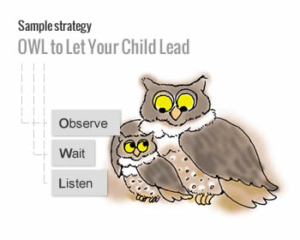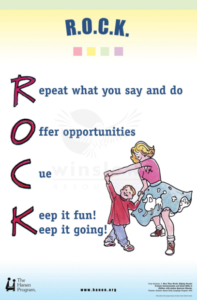 Children with speech and language delays or disorders, showcase a wide variety of skills that can be nurtured and shaped to improve communication. Building their reserve language is the key to the process. The groundwork for language building strategies starts with observation and gathering more information about the child. Supporting your child’s communication begins with letting the child take the lead. This can be done by “observing”, “waiting” and “listening”.
Children with speech and language delays or disorders, showcase a wide variety of skills that can be nurtured and shaped to improve communication. Building their reserve language is the key to the process. The groundwork for language building strategies starts with observation and gathering more information about the child. Supporting your child’s communication begins with letting the child take the lead. This can be done by “observing”, “waiting” and “listening”.
Observe: Determine what your child is interested in by looking in the direction the child is looking, pointing, or reaching.
Wait: Stop talking, lean forward, and look at your child expectantly. This prompts the child to take the lead. It also gives you and your child time to observe and respond.
Listen: Pay close attention to your child’s sounds and words which builds confidence and self-esteem. If you can’t understand or guess your child’s message, imitate his/her sounds or actions. Keep it fun!
Once you have observed, waited, and listened to your child, it’s time to “R.O.C.K”. The following strategies can then be applied to facilitate communication:

Repeat just about anything! Try to ‘ADD it in’ at least 5 fun times (repeat your words, games, songs, toys, books, movement games and more. Have them hear it from you and other people).
Offer opportunities and turns.
Cue your child to take their turn (use models, exaggeration, body language, songs, props, change of pace, stop actions, physical help).
Keep it going and keep it fun for both of you.
Here are the DOs and DON’Ts for successful communication:
What Successful Conversational Partners Do:
- They SAY something then WAIT for the other person to take a turn.
- They LISTEN to what the other person is saying and SHOW their interest.
- They COMMENT on what the other person has just said or ASK questions.
- They try to UNDERSTAND how the other person thinks and feels.
What Successful Conversational Partners Don’t Do
- They DON’T ask question after question (they DO ask one or two)
- They DON’T do all the talking or all the listening (they DO take turns)
- They DON’T insist on talking only about one thing (they DO use variety)
Happy Parenting!
